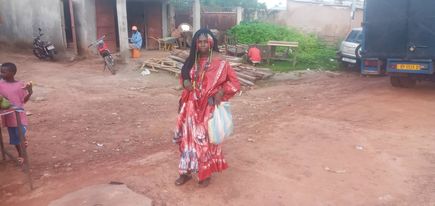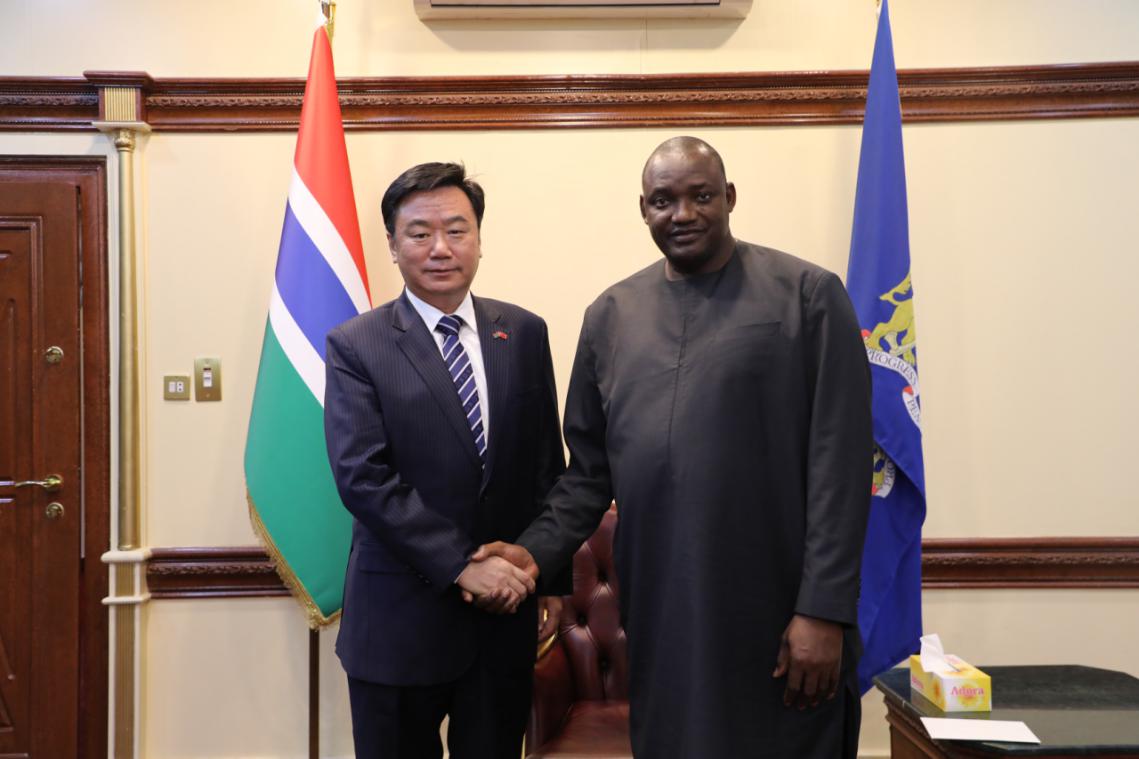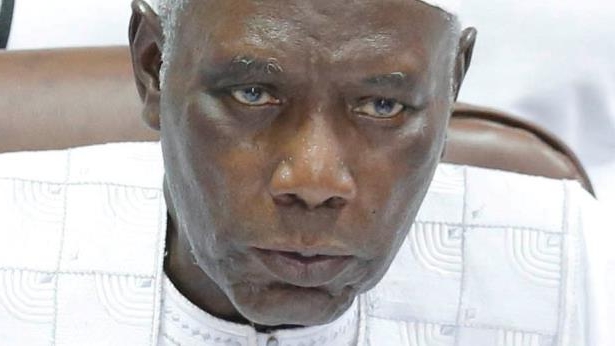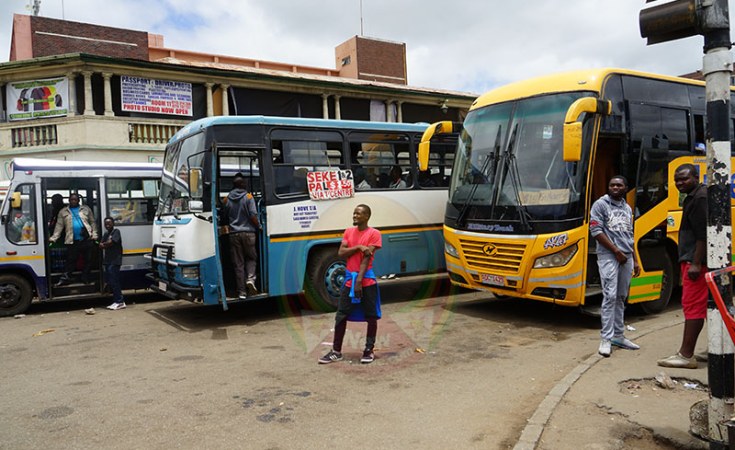By Kebba Ansu Manneh
On March 27, 2000, BintaManneh, 15 years old at the time and in seventh grade at Brikamaba Upper Basic School was full of joy and happiness when the news of her participation at an annual inter-school sports competition was announced by her Physical Education Teacher. What she did not know was that her happiness will be cut short in a horrific turn of events by unprofessional security personnel who were supposed to protect her.
Participating in such a national competition was a rare opportunity that every rural Gambian student yearns for as it offers the opportunity to visit the city as well as the national stadium called the Independence Stadium, where the national event is annually held. It also offers the opportunity of meeting and interacts with many other Gambia students coming from far and wide to attend and participate in the event. Like any other participant, Binta Manneh was full of joy and happiness to be part of such an important event and also to go back to the province with a medal on her neck that she can share with friends and family who celebrated her selection.
However, this joy and happiness in the heart and mind of the young athlete were short-lived marred by a disastrous ending that eventually turned into shock, sorrow, and nightmare with an everlasting mark of pain and bitterness at around 8 pm en route to a nearby local grocery shop not far from the Independence Stadium a paramilitary officer of the Gambia Police Force took advantage of her thus subjecting her to violent rape.
On 10th April 2000, this incident meted out on the 15 years old athlete couple with the case of another student victim one Ebrima Barry, who was allegedly tortured to dead by officers of Fire Service, triggered anger among Gambian students leading to an April 10 and 11, 2000 student demonstration organized by the defunct Gambia Students Union (GAMSU) that was heavily crushed by soldiers and paramilitary officers with a recorded loss of lives of twelve students, one red-cross volunteer, and a minor.
“I wouldn’t want to talk about my rape incident because to me it’s always fresh in my mind and I don’t think I will ever forget the pain and trauma that I was subjected to by a callous and senseless Paramilitary officer who took advantage of me because of my age and vulnerability to commit such a disgraceful act while I was on national duty.
To date I disperse anyone in a uniform, I don’t even want to interact with or befriend anyone who wears a uniform. It is not because I hate all uniform men but because it reminded me of the past, the bitter experience that government has failed to take action against, it pains me a lot and I do not want to talk about it,” Binta Manneh emotionally expressed.
“By now, I would have been holding a good position in the government but this dream of mind only remains wishes, especially since it has made me a drop-out, forced me into early marriage, and made me a permanent housewife. I couldn’t complete my schooling because anytime I wore a uniform to school people’s attention was always on me both in town and at school. I was the center of discussion everywhere in and around the community, and this took a difficult load for me, and eventually, I left school.”
The 37 years old disclosed that the former Governor during Yahya Jammeh’s era refused to give due consideration to her case by failing to bring her perpetrator to book for committing such a heinous crime that has gravely impacted her life negatively. She added that the coming of the Adama Barrow-led Government in December 2016, was a watershed moment for her and many other victims who were anxiously waiting for justice and closure to their cases.
“With the coming of President Adama Barrow, we (victims) were very positive and optimistic about justice especially when his government launched the Truth Reconciliation and Reparations Commission (TRRC) to look into various forms of abuses and rights violations committed during the time of Yahya Jammeh. The Commission has done a good job and submitted its reports and recommendations to the government that it has accepted and promised to implement but still now we don’t hear anything from them, making us wonder whether they have the commitment and political will to serve justice and bringing closure to our cases,” Binta Manneh expressed with doubt.
She added: “Currently, life is unbearable and difficult for me, I have four kids who are all going to school and taking care of their bills couple with other family issues remain an extremely difficult burden on my head because my husband who used to be the breadwinner of the family is no more working. To be honest most of us are going through difficult moments of our lives and it is only the Government that can help us to bring closure to our cases by implementing the recommendations of the TRRC.”
On 25th, May 2022, the Gambian Government published the much-awaited Whitepaper accepting almost all the recommendations contained in the reports of the Truth Reconciliation and Reparations Commission (TRRC) that was set up to look into various cases of human rights violations and abuses committed during the 22 years rule of former President Yahya A.J.J. Jammeh.
The government has also promised to set out its roadmap for the implementation process that will not only be transparent but involves a wider consultation with stakeholders throughout the process as well as adopting a victim-centered approach that will witness the participation of the victims at every stage of the implementation process.
However, Binta Manneh observed that these promises made by the government are far from practical and remain only on the whitepaper as victims are yet to be informed of any roadmap for the implementation process of the TRRC recommendations. She disclosed that many victims of the former regime are already dying from atrocities meted out on them and the failure of the Government of President Adama Barrow to implement the recommendations of the TRRC as it rightly promised.
“I am not aware of any process of implementation of the TRRC recommendations and I have never been informed about any roadmap published by the government from either the victims center or the Ministry of Justice or by the Government itself. For me, I believe that immediately after the submission of the TRRC Report and recommendations it wouldn’t take any longer for victims to have closure,” April 2000 raped victim disclosed.
She added: “I can say so far nothing is moving as far as finding closer to victims cases are a concern and unfortunately what we are seeing right now is that the government has started rewarding the perpetrators with Ambassadorial positions rather than implementing the recommendations of the TRRC. To me, by now, victims of the former regime should be thinking of other things rather than seeking closure because they have been waiting for so long.”
The mother of four observed that the delay in payment of reparations is also having a devastating impact on the lives and livelihoods of victims and their families both mentally, psychologically, socially, and financially, reaffirming that many victims are still in need of medical treatment, skills acquisition and support for children education, rehabilitation among others but victims are yet to see that political will in Government by bringing closure to victims any time soon.
“For me, I was given nineteen thousand dalasis after my testimony at the TRRC, although I was told that they will call me for my balance of eighty-one thousand dalasis (D81, 000) up to today, no one ever call me to say whether my balance of the reparation is blue or white. Imagine a victim like myself who has been waiting over 20 years, with a big family to fend for, what do you think one hundred thousand dalasi (D100,000) will do for me? As for me, this is a big joke and mockery from the government,” Binta Manneh emotionally explained.
“At least for me, I got little but how about the many other raped victims of Jammeh, how about those who leave big families behind, how about those confined in wheelchairs, those in need of medical attention, and many others who want to keep their kids in school. The situation is so sad and pathetic on the side of the victims, we need the support of the government to ensure that reparations are paid to victims without further delay.”
The Gambia Center for Victims of Human Rights Violations (GCVHRV) has been at the forefront of the matters relative to victims of the former regime and has since been engaging both victims and the government on the way forward for closure, however, its National Coordinator, Adama Jallow, collaborated the revelations of Binta Manneh when he told this reporter government is yet to come out with a roadmap for the implementation of the TRRC recommendation.
“Honestly, there is no roadmap that I have seen or heard from the Government, and this is what we (the victim’s Center) are waiting for as a victim-centered organization. We would like the Government to come up with a road map so that all stakeholders can work towards it in terms of implementing TRRC recommendations. That is what we have been advocating for,” Adama Jallow, National Coordinator submitted.
Victims Center National Coordinator underlined that whatever roadmap the government is coming out with must include an amendment to the 1997 Constitution so that the TRRC’s work will not be only limited to certain cases and living behind others, observing that extra-judicial killings including torture, enforced disappearances are cases that are not in 1997, Constitution and if left unaddressed it will affect the implementation process.
Dilating on the impact of rape on victims, Mariama Jobarteh, Founder of Fantanka, a victim-led advocacy agency said rape has an everlasting effect on victims both mentally, psychologically, and socially that continue to hurt them for the rest of their lives, noting that victims subjected to rape usually gone through a lot of societal pains including name-calling, stereotyping, labeling and depression that can lead to mental disturbances and even suicide.
She observed that both the school authorities at Brikamaba and the former government failed to meet up to their expectation in the case of Binta Manneh for neglecting her during the period. She argued that if proper mechanisms were in place at the school and the government accepted and apologized to the victim she could have completed her schooling just like her peers but both institutions failed woefully in ensuring that the rape victim overcomes the trauma she was subjected to by a security officer.
 The rights activist also downplayed the government’s commitment and the political will to implement the recommendations of the TRRC report thus bringing closure to the numerous cases of the victims of the Jammeh administration, affirming that so far, the government is yet to come out with any definitive roadmap that will ensure the implementation process of the recommendations of the TRRC report as well bring closure for victims.
The rights activist also downplayed the government’s commitment and the political will to implement the recommendations of the TRRC report thus bringing closure to the numerous cases of the victims of the Jammeh administration, affirming that so far, the government is yet to come out with any definitive roadmap that will ensure the implementation process of the recommendations of the TRRC report as well bring closure for victims.
However, it seems there is no timeline for the implementation of the TRRC Recommendations as alluded to by the Attorney General and Minister of Justice Honourable Dawda A. Jallow, recently when he informed the National Assembly’s Human Rights and Constitutional Matters Committee that The Gambia government does not have resources available to commence implementation of the TRRC recommendations this year. Noting that the government is mindful that the TRRC White Paper has been published in the media at a time the government budget was already cast.
“We do not have resources available for the implementation of the TRRC this year,” he noted.
For now, Binta Manneh and all victims of the former regime will wait even longer before any closure.
Author: Kebba Ansu Manneh is an Award Winning Journalist with a wealth of experience in Court, Legal, Transitional Justice, Environment and Agriculture reporting.
Courtesy of Freedom House Organization The Gambia Office






